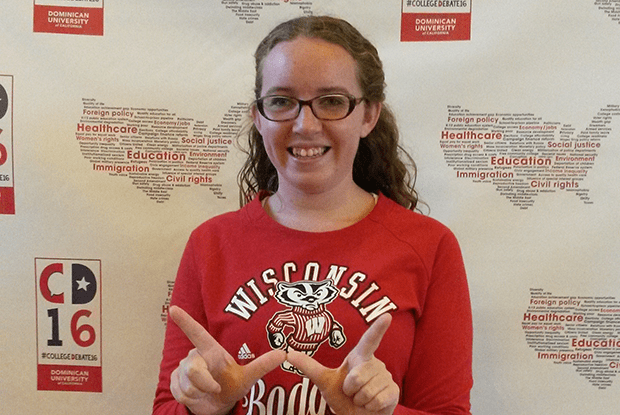UW-Madison student part of convention to select presidential debate questions

UW-Madison student Jacquelyn Moss helped select questions that will be submitted to be asked at the first presidential debate. UW-Madison
A UW–Madison student was part of a group of college students who came up with a list of questions they hope are asked in the first presidential debate on Monday, between candidates Hillary Clinton and Donald Trump.
The 2016 College Debate is a first-of-its-kind, nonpartisan program with the goal of giving a voice to college students across the country during the three presidential debates that will take place this fall. It will present the Commission on Presidential Debates with its list of questions, although there is no guarantee they will be used.
“The theory was, what if youth issues decide the next U.S. President?” says Jacquelyn Moss, who represented UW–Madison. About 83 million millennials could make up 31 percent of the voting age population.
In June, student delegates from more than 150 college campuses around the country gathered for three days at Dominican University of California to begin a discussion on the issues most important to them. They left with the tools to organize issue-focused events at their schools and then spent the summer gathering perspectives on important issues from their peers.
From Sept. 6-8, the delegates returned to Dominican for the 2016 College Convention, where they chose five issues to focus on: education, social justice/civil rights, economy/income inequality, foreign policy, and immigration.
“As we stood in various parts of the room for each issue, the conversation got heated,” says Moss, a Wausau native who is pursuing a master’s degree in curriculum and instruction. “At one point we were deciding between the environment and foreign policy and it was almost split. We had a representative from each give their argument and we eventually decided on foreign policy.”
On the second day of the convention, delegates created three specific questions for each policy area, which were then brought to a town hall event broadcast live by mtvU and ABC Digital.
During the 90 minute event, students shared personal stories about the topics and read the questions developed. The group took a vote to determine the final question in each policy area, with two ultimately chosen under foreign policy because of a tie vote.
After a months-long process and days of debate, the delegates had six questions in hand. The event culminated in planning next steps for engaging the delegates’ campuses and getting the debate moderators to accept the questions.
For Moss, the 2016 College Convention was an opportunity for students to dispel stereotypes.
“Civic engagement is my passion,” says Moss. “I hate our generation being considered disengaged or uninterested in the political process. I think that is simply untrue and I want to contribute to any effort that disproves that. I honestly believe our democracy is better served with everyone voting, even the people I do not agree with.”
Moss is a special registration deputy with the City of Madison and also works for the Campus Election Engagement Project, which assists Wisconsin’s colleges and universities in getting their students ready to vote. Through her work, she finds students want to be involved but don’t always know how to navigate the complex process.
“Students aren’t disinterested. They want to participate but the process can be complicated, and through my work I seek to ease the process,” says Moss. “I know we can be the most active generation with a little support and encouragement from our fellow peers and citizens.”
Moss also worked with the Morgridge Center for Public Service at UW–Madison to bring a program to campus in the fall called “Bring it to the Table” which seeks to build civil dialogues.
Now the delegates will wait to see if their questions are read by the debate moderators.
The final questions are:
—Economy and Income Inequality
How would you restructure governmental assistance programs for the unemployed or impoverished to obtain self-sufficiency?
—Foreign Policy
- What specific circumstances would prompt the United States to use military resources in a foreign country? How would you utilize the nation’s military resources?
2. How do you plan on supporting Syrian civilians without creating further conflict with other political actors?
—Social Justice/Civil Rights
What will you do to reduce the recidivism and mass incarceration rates in communities where poverty and violence are prevalent?
—Immigration
What is your plan for aiding the employment of skilled refugees and immigrants in their respective fields?
—Education
How will you ensure quality education to areas of socioeconomic disadvantage both in terms of K-12 and access to higher education?




